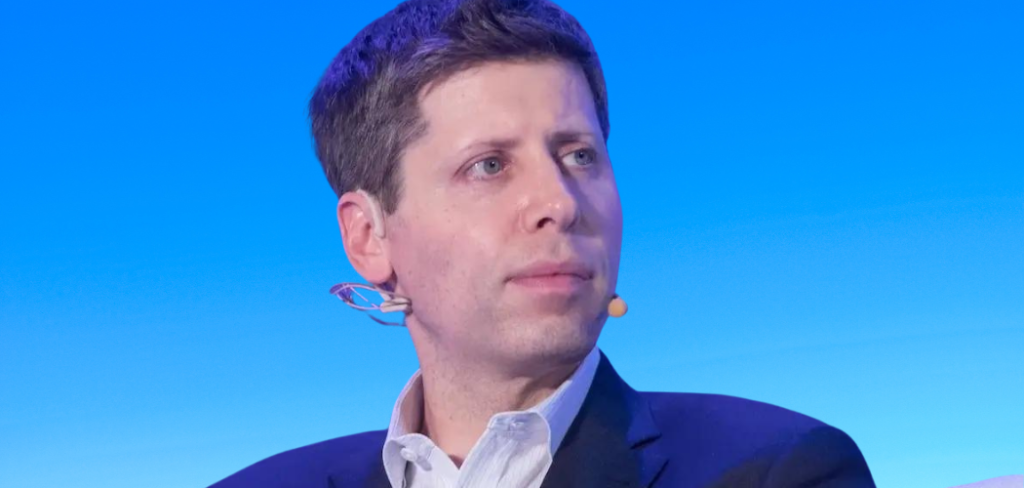According to The Wall Street Journal, Sam Altman, CEO of OpenAI, is aiming to revolutionize the global semiconductor industry through a massive investment initiative amounting to trillions of dollars.
Altman has voiced concerns about the limitations of AI chips, which he believes are hindering OpenAI’s expansion. To address this issue, he is in discussions with various investors, including the government of the United Arab Emirates, to increase chip-building capacity on a global scale.
The Journal reports that Altman may need to secure funding between $5 trillion and $7 trillion for this ambitious project, although CNBC has not independently verified this figure.
Sam Altman, the CEO of OpenAI, is embarking on an ambitious quest to secure trillions of dollars in investments, aiming to revolutionize the global semiconductor industry. This initiative, as reported by The Wall Street Journal, underscores Altman’s long-standing concern over the scarcity of AI chips and its inhibiting effect on OpenAI’s growth trajectory. He envisions a project that would substantially augment global chip-building capacity, and discussions with potential investors, including the government of the United Arab Emirates, are already underway.

The scale of Altman’s vision is staggering, with estimates suggesting he may need to amass between $5 trillion and $7 trillion to realize this endeavor. However, CNBC was unable to independently verify this figure, and OpenAI refrained from providing a comment when approached for clarification.
Altman’s rationale behind this monumental undertaking was succinctly articulated in a recent post on X, where he emphasized the critical need for expanded AI infrastructure. He stressed that the world requires more than what current plans encompass, including increased fab capacity, energy resources, and data centers. Altman asserted that bolstering AI infrastructure and establishing a resilient supply chain are paramount for maintaining economic competitiveness, and OpenAI is committed to contributing to this imperative.
This news arrives amidst prior controversies surrounding Altman’s involvement in chip-related ventures and investments. Notably, reports emerged of his endeavors to secure billions in funding for a prospective chip venture named “Tigris,” which aimed to rival industry behemoth Nvidia. Altman’s foray into the AI chip sector began in 2018 when he personally invested in Rain Neuromorphics, an AI chip startup based in close proximity to OpenAI’s San Francisco headquarters. Subsequently, in 2019, OpenAI expressed its intent to allocate $51 million towards Rain’s chips. However, this partnership faced scrutiny when the U.S. compelled a Saudi Aramco-backed venture capital firm to divest its shares in Rain.
Meanwhile, Nvidia has emerged as a dominant force in the AI chip market, experiencing exponential growth during the recent surge in generative AI applications. The company’s GPUs power large language models developed by industry giants such as OpenAI, Alphabet, and Meta, as well as a plethora of well-funded startups vying for a share of the burgeoning generative AI market. Currently, Nvidia commands approximately 80% of the AI chip market, with a staggering market capitalization of around $1.72 trillion, positioning it close to surpassing tech titans like Amazon and Alphabet in terms of market value. Altman’s endeavors are indicative of his aspiration to disrupt Nvidia’s hegemony in this domain.
Reflecting on OpenAI’s journey, Altman’s strategic decisions have been pivotal in shaping the company’s trajectory. Notably, the launch of ChatGPT in November 2022 marked a significant milestone. At the time, OpenAI grappled with limited GPU availability and capacity, primarily positioning itself as a provider of developer and business tools. However, Altman’s bold advocacy for experimentation paved the way for the release of ChatGPT, a move that reaped unprecedented success. The bot garnered widespread acclaim, setting records as the fastest-growing consumer app in history. Today, it boasts over 100 million weekly active users, with over 92% of Fortune 500 companies leveraging its capabilities.
However, Altman’s tenure at OpenAI has not been devoid of controversy. His temporary removal as CEO prompted a flurry of resignations, including an open letter signed by a significant portion of OpenAI’s workforce, and elicited concerns from investors, notably Microsoft. Nonetheless, Altman swiftly returned to helm the company, and OpenAI has since undergone a restructuring. A new board, comprising distinguished individuals like former Salesforce co-CEO Bret Taylor and former Treasury Secretary Larry Summers, has been announced. Additionally, Microsoft secured a nonvoting board observer position, signaling its continued involvement in OpenAI’s affairs.
In conclusion, Sam Altman’s quest to reshape the semiconductor industry underscores the transformative potential of AI. With trillions of dollars at stake, Altman’s vision transcends mere business objectives; it embodies a collective endeavor to propel humanity into a future defined by unprecedented technological advancement and innovation. As OpenAI navigates this tumultuous terrain, the company remains steadfast in its commitment to realizing Altman’s bold vision, while simultaneously addressing the myriad challenges and opportunities that lie ahead.

Sam Altman’s Net Worth from OpenAI Ventures
Sam Altman, a prominent figure in the realm of artificial intelligence (AI), is renowned for his entrepreneurial prowess, executive leadership, and forward-thinking vision. As the co-founder and CEO of OpenAI, Altman played a pivotal role in steering the company’s trajectory until his unexpected departure on November 17th.
Before his tenure at OpenAI, Altman helmed Y Combinator, a renowned tech incubator renowned for nurturing startups such as Airbnb, Dropbox, and Stripe with vital seed funding. Additionally, Altman’s influence extended to the realm of angel investing, where he provided crucial support to over 100 startups, including Asana, Instacart, and Pinterest.
Altman’s multifaceted contributions to the tech landscape underscore his deep-seated commitment to fostering innovation and driving transformative change across diverse domains. His departure from OpenAI marks a significant juncture in his illustrious career, leaving a lasting imprint on the evolution of AI and technology as a whole.
Similar to iconic tech titans such as Bill Gates, Steve Jobs, and Mark Zuckerberg, Altman made the bold decision to forgo college and dive headfirst into the world of tech entrepreneurship. Despite bypassing traditional higher education, Altman’s path proved remarkably lucrative, with estimates placing his net worth between $500 and $700 million. This wealth accumulation stems from Altman’s entrepreneurial endeavors and shrewd investment strategies.
During a session in Washington, Senator John Kennedy (R-LA) posed a question to Altman regarding his financial success. In response, Altman humbly stated that he had not amassed a significant fortune, perhaps underscoring his modesty or a deliberate effort to downplay his achievements.
How Sam Altman Earned His Wealth in the Digital Age
Altman’s true net worth is often a subject of speculation due to the majority of his wealth being tied up in equity ownership within privately held companies. This characteristic of his financial portfolio makes it challenging to precisely quantify his net value. Nonetheless, the companies that Altman has either led, founded, or supported boast a staggering combined valuation of $500 billion. This figure underscores the immense impact of Altman’s entrepreneurial endeavors and strategic investments on the broader tech landscape.
Loopt marked Sam Altman’s inaugural foray into the realm of entrepreneurship. As a former Stanford computer science student, Altman co-founded the location-based social networking app in 2005, showcasing his programming prowess by crafting much of its original code. The innovative technology behind Loopt garnered attention from tech giants like Apple and Blackberry, ultimately leading to its acquisition by Green Dot Corporation in 2012 for a substantial sum of $43.4 million.
Altman’s trajectory then led him to Y Combinator (YC), where he embarked on a new chapter in his career in 2011. Recognized as one of the world’s most esteemed startup accelerators, Y Combinator boasts an acceptance rate of less than 2%, underscoring its exclusivity and prestige. Over the years, Y Combinator has been instrumental in nurturing the growth of over 4,000 startups, providing vital seed funding and invaluable networking resources. Among its success stories are household names like Doordash, Dropbox, and Reddit, cementing Y Combinator’s status as a catalyst for entrepreneurial success.
During his tenure at Y Combinator, Altman revolutionized Demo Day, transforming it from a standard startup presentation event into a captivating spectacle reminiscent of Hollywood premieres. His visionary approach involved inviting tech luminaries such as Mark Zuckerberg and Elon Musk to deliver speeches, offering invaluable insights and encouragement to aspiring entrepreneurs. For Altman, Y Combinator wasn’t just a workplace—it was a way of life. He went above and beyond, orchestrating immersive experiences like renting warehouses for week-long coding and networking retreats. These gatherings fostered a culture of collaboration and innovation among startups, fueling their growth and success.
Altman’s impact extended beyond the confines of Silicon Valley, as he embraced startups from diverse sectors including biotech and clean energy, as well as entrepreneurs from varied backgrounds. His inclusive approach broke down traditional barriers, ushering in a new era of diversity and innovation within the tech industry. Recognizing his contributions, Altman was promoted to President of Y Combinator in 2014, and in 2015, Forbes honored him by including him in their prestigious 30-under-30 list of venture capitalists.
The collective valuation of Y Combinator’s portfolio companies soared to an estimated $600 billion as of January 2023. Considering Altman’s personal investments in these startups, it becomes evident how rapidly he amassed substantial wealth. His strategic foresight and unwavering commitment to nurturing the startup ecosystem have played a pivotal role in shaping the trajectory of countless aspiring entrepreneurs and groundbreaking companies alike.
